Jonathan Bastable visits Lucerne, a lakeside city with
medieval charm, contemporary cool and a dramatic Alpine backdrop.
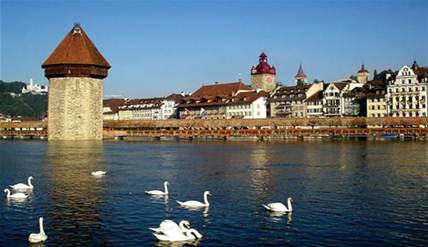
Lucerne - This is a
view of the "Old City" from the bridge.
Wherever you go in Lucerne, you are bound to catch
occasional glimpses of architect Jean Nouvel’s striking Kultur- und
Kongresszentrum (Culture and Congress Centre). Standing at the point where Lake
Lucerne funnels into the River Reuss, the modernist culture centre is the
newest symbol of the city, a contemporary counterpoint to the medieval
Kapellbrucke bridge. In daylight, from the far bank of Lake Lucerne, it looks
like a beached aircraft carrier. At night, what draws your eye is the
illuminated three-letter acronym – KKL – high on its façade. But the building
is at its most impressive close to. It sports an amazing cantilevered roof,
which juts out like the peak of a gigantic baseball cap. A large piazza
connects the building with the lakeside, and much of this broad space is taken
up with a shallow pool. Little watery pathways lead from there to the foot of
the building, where they pass under its walls. Most evenings there are people
here in this urban water meadow, enjoying a drink beneath the shade of the vast
roof before heading indoors for a performance.
The big square pond and the grey massif of the KKL combine
to make a stylized microcosm of the city’s own appealing topography, which has
the lake to the front and the granite bulk of Mount Pilatus, Lucerne’s local
alp, rising up behind. Like Mallory contemplating Everest, I felt the need to
get to the top of Pilatus, just because it was there. Unlike Mallory, I was
more than happy to do it the easy way. I bought myself a ticket for the Goldene
Rundfahrt – the golden round trip – which involves a short voyage across the
water, a cogwheel railway up the mountainside, a leisurely stroll round the
summit, and a series of cable cars back down. You’d be crazy to go to Lucerne
and not do it.
The Rundfahrt boat left exactly on time. It steamed away
from the town, keeping the tall mountain to the starboard side, and then
chuffed along the south shoreline. We passed by Richard Wagner’s pretty house,
then moved out into a world of lakeside hamlets filled with a mix of Bauhaus-
style flat- roofed condos and fantastical multi- gabled wooden cottages.
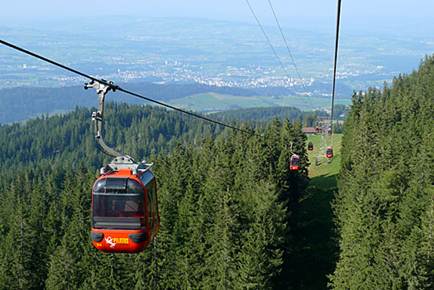
Gondolas from
Mount Pilatus to Lucerne
Occasionally our route led past a long spur in the lake, a
kind of fjord let leading off into liquid depths. These byways looked enticing,
but the ship followed its prow, deviating from its course only to make stops,
like a rural bus, at various villages along the way. I had half a mind to get
off at Kehrsiten – Burgenstock, where there was a tempting café close to the
jetty, a few good- looking homes, and a lush green field pitched at the same
steep angle as the roofs of the houses.
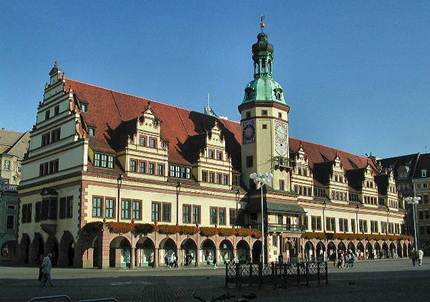
The Old Town Hall
The boat took more than an hour to amble up to Alpnachstad,
at the far end of Lake Lucerne. All the while the profile of the mountain was
changing as we moved over the blue water and the sun sailed across the equally
blue sky. We passengers piled off the boat and formed an orderly queue to board
the cogwheel railway, a kind of slow-motion rollercoaster – but one with no
downs, only ups. It is a lovely ride. Very quickly you get high enough to have
a commanding view over the lake that you just traversed. Your ears pop with the
altitude before you reach the halfway stop. In its higher reaches, the track
runs parallel to a footpath. There were a few hardy hikers trudging wearily
along it. Everyone on the train looked at them with the same expression: a
mixture of admiration and pity.
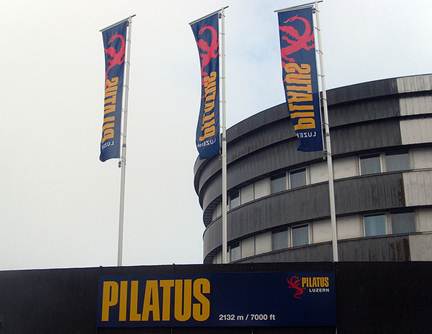
The peak of
Pilatus at a staggering 7000ft
The railway pulled in eventually at a ziggurat of a
terminus, and from here it was a short climb up some steps to the very peak of
Pilatus. Turn south, and you are looking towards the distant snowtipped peaks
of the Monch, the Eiger and the Jungfrau. They are a magnificent sight – serene
and glacial as a row of ice-carved buddhas. Turn the other way and you are
looking right down on Lake Lucerne and the city itself. You can take in the
first half- hour of your boat trip as if reading a map. Nearer by, but still
far below on a saddle of the mountain, stands a little chapel. What it is doing
in such an inaccessible spot I can’t imagine, but I could make out one pious
soul, picking his way along the ridge to preach or pray.
The descent from Pilatus is altogether quicker than the ride
up, and it is rather thrilling. The departure point for the cable car is a few
steps from the platform at which the cogwheel railway arrives, but its route
leads down another face of the mountain. Attendants pack you in like commuters
on the Tokyo underground. Hold on tight when the car sets off, because for a
few seconds it swings on its taut rope like a ship’s lantern in a gale.
Part-way down the mountainside you get out of the communal cable car and into
four- seater gondolas that follow a path cut through the dense trees. It’s a
fine way to travel – peacefully and effortlessly skimming the treetops until
you arrive back in the city, or at least a suburb of it. Your round- trip
ticket is valid for the 10- minute bus ride to the centre.
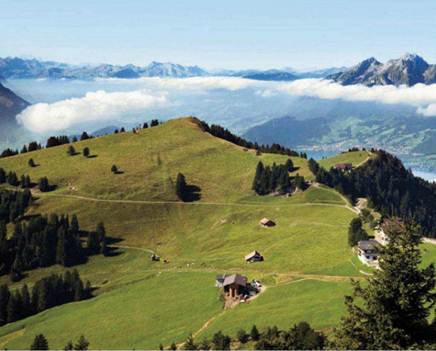
A view over
Lucerne valley to the summit of Pilatus
That evening I sat in a bar on Unter der Egg, which is the
cloistered north bank of the Reuss. This is the place to be at cocktail hour,
among the aperitif-drinkers and early diners. At one table I saw a nun, seated
all alone, devouring an ice-cream cone.
From this waterside part of the Old Town you have a grand
view of the old Kapellbrucke, its wooden balustrade garlanded with bright
flowers. Directly opposite me, on the far bank, was the Jesuit Church, its twin
cupolas like giant green heads of garlic atop a pair of shot-towers. The river
was a soothing sight. Swans, with their long interrogative necks, meandered
back and forth like unanswered questions floating across the mind.
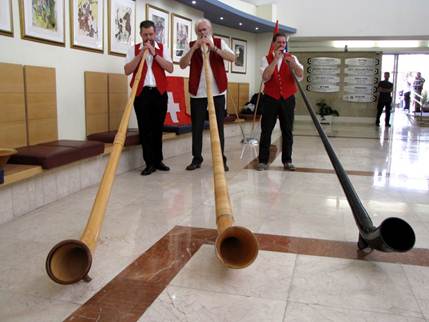
A traditional
Swiss horn player
I saw lots of people drifting slowly along the pavement
towards the KKL. Many of these happy folk were wearing their concert-going
finery: women in cocktail dresses and silk shawls, men in dark unstructured
suits with colourful open-neck shirts. It struck me as a cheerful dress code,
slightly formal, somewhat joyous. I decided to leave the bar and walk
downstream, against the flow of people, and came upon a pair of rather
marvelous constructions in the river itself. On the north bank stands a small
and unobtrusive hydroelectric station, there to harvest power from the
fast-flowing Reuss. On the surface it takes me form of various concrete
walkways and plateau, and there are people standing or sitting about on this
industrial object, soaking up the evening sun or steeping their feet in the
cool pudding water. Atop it all stands an orange wedge, about eight feet tall
with a door in its one perpendicular side. It is, no doubt, an entrance to the
incongruous, it could have been Doctor Who’s Tardis redesigned for the 21st
century by the inventive Monsieur Nouvel. Opposite the hydroelectric station,
on the other bank, is the so-called Nadelwerk (or “needleworks”), a fine piece
of 19th- century engineering. It is a system of wooden stakes, like
a long row of pizzaiolo’s paddles, which can be raised or lowered to control
the volume of water in the river. When the stakes are down, the water becomes
ruched like a curtain as it squeezes through the gap. The result is an attractive
waterfall. It is no surprise that the café tables alongside the Nadelwerk, like
the ones on the Egg, are always full.